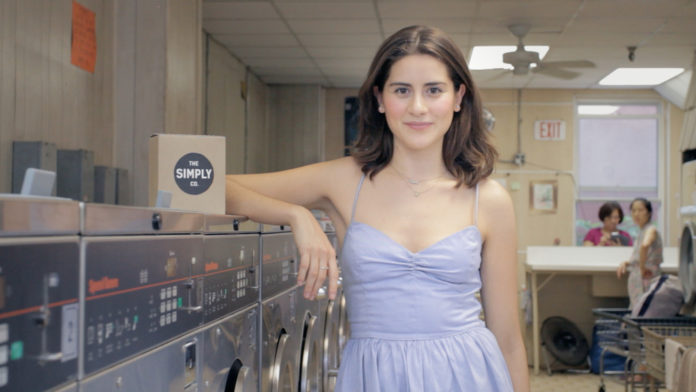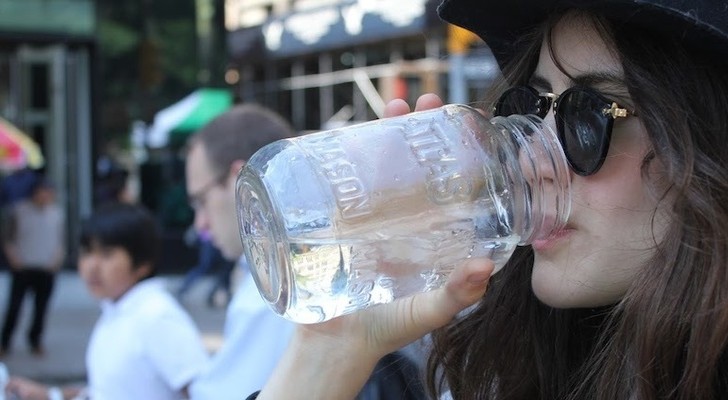
Meet Lauren Singer, the 23-year-old girl who lives a zero waste lifestyle in New York and makes her everyday products organically. She is a Zero Waste blogger at Trash is for Tossers and founder of The Simply Co. In 2012, she decided to go plastic free, and in the past two years, the amount of trash that she has produced can fit inside a 16 oz mason jar!
Lauren’s journey is quite fascinating. While studying Environmental Studies at NYU, she hosted weekly talks on environmental topics and was popular as the sustainability girl. A fellow student would bring a plastic bag containing a plastic clamshell full of food, a plastic water bottle, plastic cutlery, and a bag of chips everyday to the class and throw it all in the garbage. While this got Lauren angry, she didn’t do anything.
One day, after she came back from her class, her eyes popped out when she opened her refrigerator and realized that every item in there was wrapped or packaged in plastic. That was a life-changing moment for Lauren who took a decision to eliminate all plastic from her life – to be the green as well as the zero-plastic girl. This was definitely a tough decision: Quitting plastic meant learning to make all of her packaged products herself. She did a lot of online research and soon got rid of almost all plastic from her life.
Soon she took a leap and went from zero plastic to zero waste. First she read a blog called Zero Waste Home. It followed the life of Bea Johnson, wife and mother of two children who all live a zero waste life in California. She thought, “If a family of four can live a zero waste lifestyle, I, as a (then) 21-year-old single girl in NYC, certainly can”.
She stopped buying packaged products and started taking her own bags and jars to supermarkets. She stopped buying new clothing, and shopped only second-hand. This saved her a lot of money.
She started buying organic fruits and vegetables, bulk whole grains and legumes, as well as a lot of seasonal, local food. Her eating habits changed for the better.
She started selling, donating, or giving away surplus insignificant things in her life. Most importantly, she began saying NO to things like straws in her cocktails at bars, to plastic or paper bags at stores, and to receipts.
This transition took more than a year and required a lot of effort. By actively choosing not to produce waste turned into her having a higher quality of life. Lauren didn’t start living the trash-free lifestyle to make a statement — she began living this way because living a zero waste life was the best way to live a life that aligned with everything she believed in.
What was at first a lifestyle decision later became a blog – Trash is for Tossers, a catalyst for chatting with interesting, like-minded people, and making friends. She quit her job as Sustainability Manager for the NYC Department of Environmental Protection and started her own zero waste company – The Simply Co., where she sells the products that she learned to produce over the past two years.
Source:
http://www.trueactivist.com/i-havent-made-any-trash-in-2-years-heres-what-my-life-is-like






YES I AM THE FIRST TO COMMENT.
Let me be the first to tell you whoopty doo, lol.
This is great
Sad, considering waste per capita is still increasing at an alarming rate. Good for her though.
This is how humans look like!
What about tax right offs; need proof of that!!!!!
What about tax write offs?
funny, i was just watching ‘no impact man’ on netflix.
So she manages to buy things that don’t have price tags? Food without rubber bands, packaging, or stickers? She shops only at stores that don’t print receipts? Balderdash!
But 94% waste free isn’t a good marketing tagline
You can reuse rubber bands (I never toss them, even when they break. If they break I’ll just tie 2 together). You can burn receipts or paper boxes in your fireplace for warmth, or cooking. There are ways to reuse almost anything.
It’s called a co-op. I worked at one for years. It’s easy to buy bulk food in containers that you bring to the store yourself, and you can ask for there to be no receipt printed if you really want to.
And, price tags on food? Where do you shop for food, at gas stations?
Well done! Even though the author is educated & possibly from a middle back ground by western standards we can all gain something from another person’s endeavours even if it is a change in the smallest ways to start. Remember the author claimed it took her a year & it wasn’t easy. I guess the most important thing is reduce ask yourself do I really need this.
Balderdash indeed. Proof? Presumably she cleans her teeth and has a shower occasionally, so waste water, heating in the winter etc? Don’t believe a word of it!
She’s mainly talking about her reduction of producing trash including one-use disposables and plastic packaging deemed for landfill. She makes her own toothpaste and beauty products. I guess her next steps would be to continue working upstream, i.e. living off the grid, growing her own food etc..
lol…funny.
She also breaths and fills the would with her exhale. and she urinates and deficates. all waste production.
The trick is to understand “waste” products as resources, and handle them accordingly. Toilet ‘waste’ is recycled at the water treatment facility, and the water reused (back to the source) How they deal w/ the rest is beyond her control. She may decide to compost it. If so, good for her!
I believe you can buy food without price tags, go to your local food market, buy only fruit and veg at supermarkets. Obviously she has to live so will use products that occasionally produce waste. that’s a by product of life unfortunately. As for toothpaste you make your own out of baking soda and maybe she re-uses the pots for a different use? you can also use coconut oil, and she seems to use the jars for glasses (a trick I use 🙂 It does seem impossible, but at least she is trying. Its something we all need to do. Also tax returns im not 100% on but im pretty sure these can all be done using technology now
Some of you appear to have read only the headline and decided to trash this conscientious young woman, why is that? A pitiful attempt to rationalize your own trashy ways? Humans got by for millennia without producing garbage and many in the developing world still do .Clean up tour own acts and stop throwing literal and figurative rubbish about
She goes out to eat!? Wonder how often? The trash involved in restaurants is inevitable. Sure you didn’t use a napkin, or straw. But those steaks came in a box individually wrapped. Your roll came in a bag. Your soap to clean your dish came in a box within a box. Veggies a bag in a box. I love what she is doing but dine out and claim no waste is like. Is like saying you p**p without wiping.
So what does she use for feminine hygiene products?
The diva cup possibly
http://www.target.com/p/the-diva-cup-menstrual-cup-1-count-model-1/-/A-14297501?ref=tgt_adv_XSG10001&AFID=google_pla_df&LNM=14297501&CPNG=Health+Beauty&kpid=14297501&LID=17pgs&ci_src=17588969&ci_sku=14297501&kpid=14297501&gclid=CN3WgrLC58MCFehj7AodOjwA0Q
The probably uses a rubber or silicone cup for her period. They are reusable.
Covered on the forum on her site – lots of washable products on the market.
You can use reusable pads, they’ve been used for hundreds of years, just like reusable nappies for babies. Obviously they have to be washed so there is some energy being used but water is recycled whereas one use pads/ nappies go in landfill!
There are reusable cups for feminine hygiene.
Yippety skippety. I’ve been doing all this stuff for years–and not just on my own, which is easier than the article claims, but with a family. Not all that difficult, really. Every time some one gets on the band wagon, a blog post gets written.
why be so nasty because someone wrote about her, is it because your 15 mins of fame passed you by. Take a deep breath and celebrate the fact that something you have been doing for years is being publicised so more people stop and think about waste, life is too short to be so narky and negative!
What does she do about “that time of the month?”
Anyone else find it ironic that the advert displayed on this page states “stainless steel waste bin – very cheap – free delivery”?
Advert? 😉
i try really hard to lead a waste free life. But let’s be honest, there are things you can’t avoid and are more than a mason jar. Toilet paper in its wrapping, tampons, pads, condoms, dental floss in the plastic cartridge, the new tooth brush you get every three months, broken light bulbs, and on and in. I think it’s great that she is leading a waste free life, but let’s be realistic as to what that actually means!
It is possible but a bit hard not to use plastic. There is a great documentary about a Finish family that lives a year without buying anything containing or wrapped in plastic called Katastrofin Aineksia. In case you plan to watch it I should mention that there is no english sound or text.
To go completely without producing waste is even harder. You have to redefine what waste is and try to reuse or recycle a lot.
E.g. is it waste if you burn it to create heat in your home and the ashes from the fire is used in the garden?
A thought is that most developed nations produce about half the waste that an American do and even then it is really easy to cut you waste in half. So, for a typical American it should be quite easy to cut waste to a quarter.
Instead of undertaking the major effort to go to zero waste just inspire a few more families to cut their waste in half. Better for the environment and much less effort.
Watch it on your TV or computer which is made of plastic? Ironic.
Zero plastic life, but can read a blog?
What on, a wooden computer?